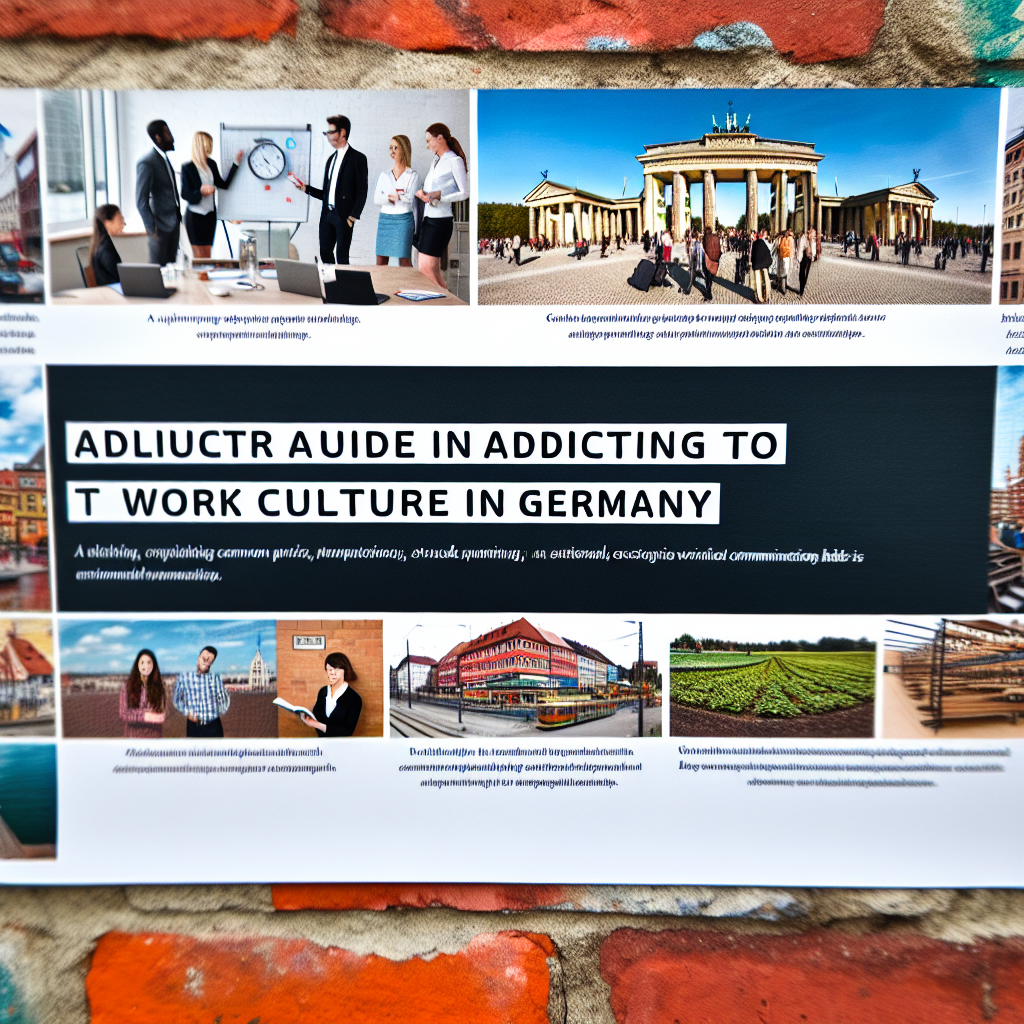
Adapting to the work culture in Germany: A guide for expats
-
Table of Contents
“Thrive in Germany: Mastering Work Culture as an Expat”
Introduction
Adapting to the work culture in Germany can be a challenging yet rewarding experience for expatriates. The German workplace is characterized by a strong emphasis on efficiency, punctuality, and formality. Understanding and integrating into this environment is crucial for professional success and personal satisfaction in Germany. This guide aims to provide expats with essential insights and practical tips on navigating the German work culture, from communication styles and hierarchical structures to work-life balance and business etiquette. By familiarizing themselves with these aspects, expats can effectively adjust and thrive in their new professional settings.
Understanding German Business Etiquette: Key Practices for Expats
Adapting to the work culture in Germany can be a rewarding yet challenging experience for expats. Understanding and integrating into German business etiquette is crucial for professional success and personal comfort in this new environment. German business culture is characterized by its directness, punctuality, and adherence to rules and structure, which can be quite different from other cultural contexts.
Firstly, punctuality is paramount in German business culture. Arriving on time for meetings, appointments, and even social gatherings is considered a sign of respect and reliability. In fact, it is advisable to arrive a few minutes early to demonstrate your commitment. This emphasis on punctuality reflects the broader German value of efficiency and planning. For expats, this means careful scheduling and time management should be a priority to align with the expectations of German colleagues and business partners.
Moreover, the German approach to communication in a professional setting is typically straightforward and direct. While this might seem brusque to those from cultures where indirect communication is the norm, in Germany, it is appreciated because it is seen as a way to achieve clarity and precision. Expats should be prepared to engage in frank discussions and not misinterpret this directness as rudeness. It is simply a different way of exchanging ideas and information, aimed at maximizing productivity and reducing misunderstandings.
In addition to direct communication, formality plays a significant role in German business interactions. Titles and surnames are commonly used in professional settings, and it is important to address individuals correctly until invited to use first names. This formality extends to written communications and emails, which are expected to be formal, concise, and devoid of personal emotions. Understanding these nuances can help expats navigate their initial interactions with German colleagues and establish a foundation of mutual respect.
Another key aspect of German business etiquette is the importance placed on structure and organization. Meetings are expected to follow a clear agenda, with participants prepared to contribute substantively to the discussion. Documentation and presentations should be thorough and well-prepared, reflecting a deep respect for detail and accuracy. For expats, adapting to this structured approach may require an adjustment in preparation habits and meeting conduct to meet the expectations of German business culture.
Furthermore, decision-making in German companies tends to be hierarchical, with decisions often made at the top levels of the company. However, these decisions are typically the result of thorough analysis and consultation with experts at various levels. As an expat, it is important to understand where decision-making power lies and to respect the established hierarchy while also being prepared to provide detailed input when required.
Lastly, building relationships in the German business context tends to be slow and based on trust developed over time through consistent professional behavior. Socializing with colleagues may not be as common as in other cultures, but when it does occur, it remains relatively formal. Expats should be patient and invest time in gradually building these relationships, understanding that personal and professional boundaries are often maintained more strictly.
In conclusion, adapting to German business etiquette involves understanding and respecting its emphasis on punctuality, direct communication, formality, structure, hierarchical decision-making, and the gradual development of business relationships. By embracing these practices, expats can effectively integrate into the German workplace, contributing to their success and well-being in a new cultural setting.
Navigating Communication Styles in German Workplaces
Adapting to the work culture in Germany can be a rewarding yet challenging experience for expats. One of the most significant aspects to navigate is the communication style typically found in German workplaces. Understanding and adapting to this style can greatly enhance an expat’s effectiveness and integration within their team.
German business culture highly values clarity, directness, and precision in communication. This is evident in both written and verbal exchanges where clear, unambiguous language is preferred. Expats should be prepared to communicate in a straightforward manner. For instance, when presenting an idea or giving feedback, it is customary to get straight to the point without excessive embellishments. This direct approach is not intended to be brusque but is rather a sign of respect for everyone’s time and a way to avoid misunderstandings.
Moreover, this preference for directness is coupled with a strong adherence to formality, especially in initial encounters. Titles and surnames are commonly used in professional settings, and it is advisable for expats to do the same until invited to use first names. This formality helps maintain a level of professionalism and respect. It is also typical for emails and other forms of written communication to follow a formal structure, beginning with a polite greeting and ending with a formal closing.
In addition to directness and formality, punctuality is a cornerstone of professional life in Germany. It is seen as a sign of respect and reliability. Being on time for meetings, appointments, and even social gatherings is expected. In fact, arriving even a few minutes late can be perceived as disrespectful or unprofessional. Expats should, therefore, make it a priority to manage their time effectively to adhere to this cultural norm.
Another aspect of communication in German workplaces is the separation of personal and professional life. Small talk, while acceptable, is generally brief and not as common as in some other cultures. Conversations typically focus on work-related topics during business hours, and personal matters are usually not discussed at length. This separation helps maintain professionalism and focus on work tasks. Expats should be mindful of this distinction and avoid oversharing personal details unless they are clearly relevant and appropriate in the context.
Furthermore, decision-making in German companies often involves thoroughness and diligence. There is a strong preference for gathering extensive background information and analyzing all aspects of a situation before reaching a decision. This methodical approach can sometimes make decision-making processes seem slow to those from cultures where quicker decisions are the norm. However, once a decision is made, it is usually final and followed by swift implementation.
Lastly, feedback in German workplaces is often straightforward and detailed. It is intended to be constructive and is based on the belief that clear, honest feedback can lead to improvement and professional growth. Expats should be prepared to receive and provide feedback in a direct but respectful manner, viewing it as an opportunity for development rather than criticism.
In conclusion, while the communication style in German workplaces may initially seem daunting to expats, understanding and embracing these nuances can lead to successful and fulfilling professional interactions. By appreciating the value placed on directness, formality, punctuality, and thoroughness, expats can effectively adapt to their new work environment in Germany.
Building Professional Relationships in Germany: Tips for Expats
Adapting to the work culture in Germany can be a rewarding yet challenging experience for expats. Understanding and integrating into this environment requires not only knowledge of the language and basic work ethics but also a deeper appreciation of the subtle nuances that define German professional relationships. This guide aims to provide expats with essential tips to navigate and succeed in the German workplace.
Firstly, punctuality is paramount in Germany. It is a reflection of your respect for other people’s time and your professionalism. Arriving even a few minutes late can be perceived as disrespectful. Therefore, it is advisable to always be on time, or even a few minutes early, for every appointment or meeting. This practice not only sets a positive tone for your interactions but also builds trust with your German colleagues.
Moreover, Germans generally maintain a clear distinction between personal and professional life. Small talk, while acceptable, is usually brief and not deeply personal. When building professional relationships, it is better to focus on work-related topics or mutual interests such as sports or cultural events. This approach helps in keeping the conversation relevant and respectful of personal boundaries.
Additionally, communication in German workplaces is often straightforward and direct. This might be surprising to expats from cultures where indirect communication is common. In Germany, being clear and concise is valued; people say what they mean and expect the same from others. It is important for expats to adapt to this style of communication to avoid misunderstandings and to be taken seriously by their peers.
Another key aspect to consider is the hierarchical structure in many German companies. Decisions are typically made at the top levels of the company and there is a strong respect for authority. It is crucial for expats to recognize and respect this hierarchy. Understanding your place within this structure and acting accordingly can help you navigate your work environment more effectively. When in doubt, it is advisable to follow the lead of your colleagues or seek guidance from your supervisor.
Furthermore, Germans are known for their thoroughness and attention to detail. They take pride in producing high-quality work and expect the same level of professionalism from others. For expats, paying close attention to detail and striving for precision in your work can go a long way in earning the respect and trust of your German colleagues. This meticulousness is not just about adhering to standards but also about contributing positively to the team and the project outcomes.
Lastly, it is beneficial to engage in team activities or company events. These can be excellent opportunities for expats to better understand the work culture and to build stronger, more collegial relationships with their German counterparts. Participating actively in such events demonstrates your willingness to integrate and can significantly enhance your professional network within the company.
In conclusion, adapting to the work culture in Germany as an expat involves understanding and respecting the local norms and practices. By being punctual, maintaining professionalism in communication, respecting the hierarchical structure, paying attention to detail, and engaging with colleagues during team events, expats can effectively build and nurture professional relationships. These efforts will not only facilitate a smoother transition but also contribute to a successful and fulfilling career in Germany.
Adapting to German Work-Life Balance: Strategies for Success
Adapting to the work culture in Germany can be a rewarding yet challenging experience for expats. One of the most significant aspects to understand and embrace is the German approach to work-life balance, which is often quite different from what many foreigners might be accustomed to. This balance is not only a cornerstone of workplace satisfaction but also a critical factor in maintaining productivity and overall well-being.
In Germany, there is a strong emphasis on efficiency during work hours. Germans are known for their punctuality, precision, and directness in professional settings. Work typically starts early, with many employees arriving by 8:00 AM or earlier, and the focus is on maximizing productivity during these hours. This concentrated effort allows for a more definitive separation between work and personal life, which is highly valued.
Moreover, it is common for German companies to discourage overtime unless it is absolutely necessary. This practice stems from a belief that excessive working hours can lead to burnout and decreased quality of work over time. Therefore, expats should be prepared to adapt to a work environment where leaving on time is not only accepted but expected. This can be a significant shift for those from cultures where long hours are the norm and often equated with job dedication.
Transitioning to this aspect of German work culture requires a clear understanding of work expectations and effective time management skills. Expats should strive to demonstrate efficiency and productivity during work hours to align with their German colleagues’ values. It is also beneficial to familiarize oneself with the specific norms and rules of the workplace, as these can vary significantly from one company to another.
Another key element of the German work-life balance is the robust legal framework that supports it. Germany has strict labor laws that regulate working hours and conditions, including a maximum workweek and mandatory rest periods. These laws are designed to protect employees and ensure that they have sufficient time to recover and enjoy personal activities, which enhances overall job satisfaction and life quality.
Expats should take full advantage of the opportunities these regulations provide. Engaging in leisure activities, exploring cultural offerings, and traveling within the country can not only enrich an expat’s life in Germany but also help in building relationships with German colleagues who likely value similar pursuits.
Furthermore, it is important for expats to respect the clear boundaries that Germans tend to maintain between their professional and private lives. For instance, small talk and personal discussions are not as common in German workplaces as they might be elsewhere. While friendly, many Germans prefer to keep interactions at work more formal and focused on the task at hand. Understanding and respecting this aspect of the culture can help expats build stronger, more respectful relationships with their colleagues.
In conclusion, adapting to the work-life balance in Germany involves appreciating and aligning with the local emphasis on efficiency, respecting boundaries, and taking advantage of the protections and opportunities provided by German labor laws. By doing so, expats can not only succeed professionally but also enjoy a fulfilling and balanced life in Germany. This adaptation process, while perhaps challenging at first, can significantly enhance an expat’s experience and provide a deeper understanding of the German way of life.



